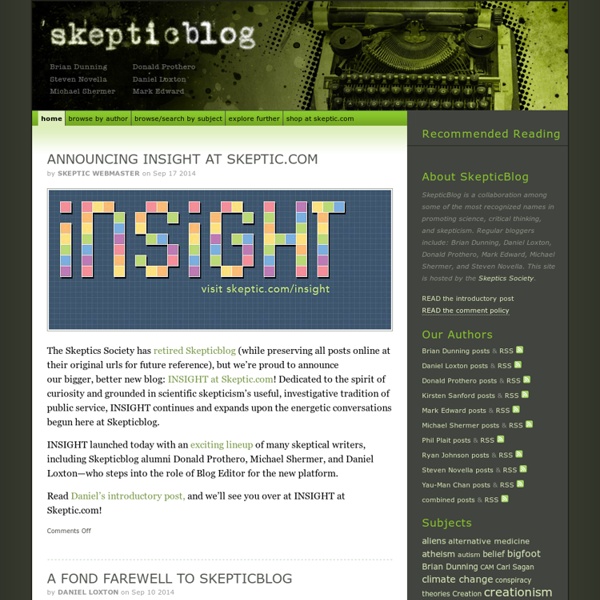



Biology of Religion 03. March 2012, 11:06 The online-magazine Evolution: This View of Life did get a new (and, if I might say, awesome) look. For example, the recommendation of John Jacob Lyons, who is a regular commentator here, about presenting the number of comments to each post has been fulfilled. More than ever, the brilliant team with active members such as Robert "@RobertMKadar" Kadar and Hadassah "@Haddie" Head is experimenting with new media possibilities such as videos. After seeing this well-done tutorial, I decided to add a web-interview and sent him some questions. 1. My professional life is devoted to expanding evolutionary science beyond the biological sciences to include all aspects of humanity--in my own research, in higher education (EvoS), and in the formulation of public policy (The Evolution Institute). 2. 3. After decades of studying group selection and human evolution, it only made sense to study religion from an evolutionary perspective. 4. I couldn't agree more.
Bad Astronomy Well now, this is an interesting discovery: astronomers have found what looks like a "super-Earth" – a planet more massive than Earth but still smaller than a gas giant – orbiting a nearby star at the right distance to have liquid water on it! Given that, it might – might – be Earthlike. This is pretty cool news. We’ve found planets like this before, but not very many! Now let me be clear: this is a planet candidate; it has not yet been confirmed. The star is called HD 40307, and it’s a bit over 40 light years away (pretty close in galactic standards, but I wouldn’t want to walk there). Massive planets tug on their star harder, so they’re easier to find this way. In this case, HD 40307 was originally observed a little while back by HARPS, and three planets were found. We don’t know how big the planet is, unfortunately. That’s exciting because of the prospect for life. Here’s a diagram of the system as compared to our own: Image credits: ESO/M. Related Posts:
Skeptically Speaking eSkeptic » Wednesday, July 25th, 2012 A Magician in the ClassroomUsing Magic and Mentalism to Teach Skepticism by Paul Goodin Anyone who teaches can relate to running into the occasional brick wall when trying to convey new ideas. To teach critical thinking and impart a skeptical outlook is difficult in and of itself. But when you are teaching where a majority of the students have strong religious convictions, it can be an even greater challenge. Although I teach an advanced writing course, I believe critical thinking is as important to writing as grammatically sound work. I discovered my amateur magician’s skills were a valuable tool to use to introduce a topic that might otherwise be unpalatable to a group where a majority of them hold strong, unmoving religious convictions. Although student reactions vary from class to class, they are usually consistent on the whole. When explaining my methods, I walk a fine line between debunking their beliefs and revealing magician’s secrets. Explore the 101 Resource Center Order the book
A Theory of Mind Science-Based Medicine Top 20 Logical Fallacies - The Skeptics' Guide to the Universe Introduction to Argument Structure of a Logical Argument Whether we are consciously aware of it or not, our arguments all follow a certain basic structure. They begin with one or more premises, which are facts that the argument takes for granted as the starting point. Then a principle of logic is applied in order to come to a conclusion. Premise1: If A = B, Premise2: and B = C Logical connection: Then (apply principle of equivalence) Conclusion: A = C In order for an argument to be considered valid the logical form of the argument must work – must be valid. Also it is important to note that an argument may use wrong information, or faulty logic to reach a conclusion that happens to be true. Breaking down an argument into its components is a very useful exercise, for it enables us to examine both our own arguments and those of others and critically analyze them for validity. Examine your Premises As stated above, in order for an argument to be sound all of its premises must be true.
Empirical Zeal Genealogy of Religion Pharyngula Probably not. But the New York Times reports: A review of studies has found that the health benefits of infant male circumcision vastly outweigh the risks involved in the procedure. Actually, it doesn’t. Not at all. The paper is all about the frequency of circumcision in the US; this is the only real data in the paper, and notice that a good chunk of it is speculation. Prevalence of adult circumcision in the United States during the past 6 decades (1948-2010). It does toss in a table purporting to show the tremendous risks of not circumcising baby boys, but this is not new — these are the same sloppy data that the author has been peddling for over a decade. The author is Brian Morris, better known as the Man Who Hates Foreskins. Take that first condition, the likelihood of urinary tract infections. Or look at his claim of much greater rates of HIV infection. Armed with this hunch, rather than set up a website I chose to do some research. It’s also an argument that can cut both ways.
Sci-ence! A Science and Skepticism Based Comic and Blog. Sam Harris Quackwatch Epiphenom